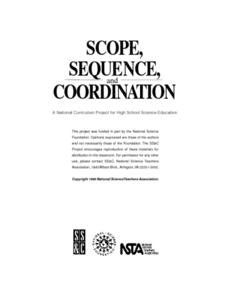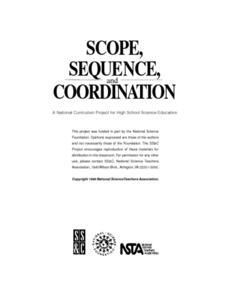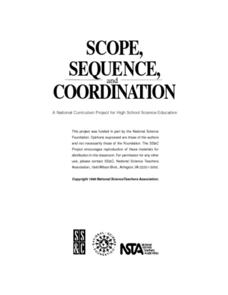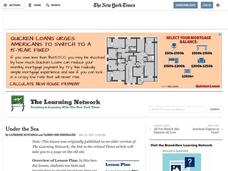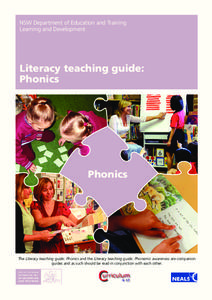Curated OER
Qualitative Aspects of Rotational Dynamics
Explanations for six different physics lab activities and five suggested assessments are contained in this resource by the National Science Teachers Association. Any combination can be used to open learners' eyes to rotational motion....
Curated OER
Properties of Aqueous Solutions
Advanced chemistry kids experiment with the freezing and boiling points of various aqueous solutions. They also prepare a presentation of the kinetics of solution formation and structure of the matter involved. This resource provides...
Curated OER
Cell Size and Shape; Diffusion and Osmosis Processes
Use salmon eggs as a cell model for demonstrating the movement of water over concentration gradients. Junior scientists examine the same process microscopically with an onion cell. They use a thistle tube and a semipermeable membrane to...
Curated OER
Coulomb's Law and Induced Polarization
Engage your aspiring physicists in a series of lab activities directied at demonstrating the behavior of electric force. In completing these exercises, learners will explore Coulomb's and Gauss's Laws. Well-written directions to four...
Curated OER
Magnetic Induction
Physicists of the future observe the behavior of current in relation to a magnet through several inquiry activities. They construct a generator and experiment with solenoid coils. They learn and apply electromagnetic laws, most often...
Curated OER
The Periodic Table, Electrons, and Chemical Bonds
Four activities immerse beginning chemists into the world of elements. They examine the periodic table, use cobalt hydroxide to learn about chemical formulae and valence electrons. Also, they name binary compounds and examine the...
Curated OER
Carbon Bonds in Chemistry
Venture into the world of macromolecules with three exciting, distinct laboratory activities. Young chemists examine the forms of carbon and discover how they are associated with atomic arrangement, construct models of carbon-containing...
Curated OER
Tests and Technology: The Tools Your Students Will Need
Tips for teachers and students as they navigate the new world of computer-based standardized assessments.
Curated OER
Acids, Bases, and Indicators
Chemistry or physical science fledglings get comfortable identifying acids and bases with a variety of pH indicators. They discover that different indicator solutions have different ranges, practice testing soil acidity, and use antacids...
Curated OER
Following the Leaders
Examine the historic election of Pope Benedict XVI and reflect on the challenges he faces as the new leader of the Catholic Church. This New York Times lesson investigates how other world leaders are chosen in different forms of...
Curated OER
Right to Remain Silent(?)
Learners consider the rights of journalists regarding source confidentiality, then create presentations on the New York Times' use of sources. They write guidelines to aid journalists in evaluating the trustworthiness of their sources.
Curated OER
Tax Jeopardy
Create a glossary of tax-related vocabulary and clip New York Times articles that present tax procedure in action, in preparation for participating in a tax quiz bowl. Young economists explore allegations that "Survivor" Richard Hatch...
Curated OER
States and Mates
Discuss and reflect on the concept of allies and alliances. The class examines the competition between the United States and Venezuela. Using the New York Times, they search for examples of geopolitical alliances. In addition, they write...
Curated OER
Truth Be Told
Encourage your middle and high schoolers to share their memories of a recent event. After reading a New York Times article, they discuss Elie Wiesel's memoir, Night. They write their own memoir about a significant event that affected...
Curated OER
Art Reflecting Life
Have your young television viewers discuss popular shows among their peers. After choosing one show to analyze, middle and high schoolers read about the 2007-2008 network television lineup with the New York Times article "Gauging Viewer...
Curated OER
Phonics Instructional Routine: Read and Write Words with Consonant Digraphs
Use consonant digraphs to introduce learners to word patterns and high frequency words. They observe a chart with the digraphs /sh/, /ch/, /th/, and /wh/. After listening to each of these phonemes, scholars watch as the teacher...
Curated OER
Denial on Trial
What is the "Faurisson Affair”? What is “Holocaust Revisionism”? What does freedom of speech entail? Do revisionists have a right to voice their ideas? Such questions are at the heart of a richly detailed, thought provoking lesson...
Curated OER
Under the Sea
Students imagine and describe fictitious sea animals that might live in the ocean. After reading an article, they reflect on new discoveries found in the ocean recently. Using the internet, they research the interdependence of animals...
Curated OER
Modern Minstrelsy: Exploring Racist Stereotypes in Literature and Life
Satires may be designed to expose a bias to ridicule but if misunderstood can they reinforce that bias? Langston Hughes poem, “Minstrel Man” opens a discussion of racist stereotypes, the minstrel tradition, and the musical, “The...
Vanderbilt University
Literacy Teaching Guide: Phonics
You don't have to be a teacher in New South Wales to appreciate this phonics teaching guide. The 73-page packet is packed with information about the principles of effective phonics programs, teaching methods, sequencing, key strategies,...
Curated OER
Short and Sweet Science
Readers learn how to summarize scientific text and evaluate the advantages, disadvantages, and challenges in writing summaries. They select science-related articles you've pulled and collected from the New York Times and, with a partner,...
Curated OER
College or Bust?
Based on a New York Times article, "The College Drop-Out Boom," participants in a fishbowl discussion formulate and express opinions about the correlation between level of education, career options, and economic mobility. Ample...
Curated OER
Is That a Fact?
Investigate popular scientific claims and gather evidence to defend or argue against an author's stance. Writers synthesize information and compose their own "Really?" columns modeled after those found in the weekly "Science Times"...
Curated OER
The War of the Words
“Who’s This Guy Dylan Who’s Borrowing Lines From Henry Timrod?” The basic question in this lesson from the New York Time’s Learning Network is whether artists and authors who use the words of others are stealing from that artist or...


